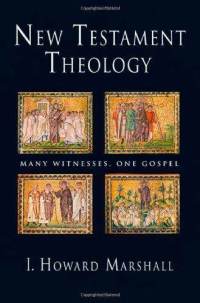 I. Howard Marshall's chapter on Romans in terms of Dogmas, Doctrines, Distinctives, and Details.* Dogmas. Marshall strongly affirms that Paul's main them in Romans in none other than the Gospel of Jesus Christ's ability to save and the subsequent answer to “Why?”. He thus affirms Paul's explanation that all people are sinners since “failure to acknowledge God leads to sinfulness” (308). This is the result of Original sin as revealed by the Law (since its role in salvation history is not a means of getting “right with God by observing the law” (309)). Salvation is portrayed as exclusively available through justification by grace through faith in Christ, whose blood was shed on the cross for sin since “to be justified is to be put into a right relationship with God, in which the sins that persons have committed are no longer counted against them and consequently they can enter into a relationship with God characterized by peace and not wrath” (310). Resurrection is indicated as “an integral part of the saving event and not just simply the restoration of Jesus to life...” after dying for sin (313). Universalism (via postmortem persuasion, etc.) is dismissed as textually unsupported (339). Doctrines. Marshall acknowledges that some scholars differ on how righteousness is applied to believers. However, while these different theories are mentioned in passing, they are dismissed quickly as undermining the salvation event of Christ (315) since they cannot accurately account for the grace which leads to redemption through atonement via the propitiation of sins. However, a false understanding of how atonement works will not negate its effects. Distinctives. In expounding on the Gospel in terms of righteousness, Marshall discredits N.T. Wright's popularized understanding of Covenantal Nomism with a mocking “Surprise, surprise” (307) to highlight its poor exegesis. He later remarks that Paul drew a distinction “not only between faith and works, but also between grace and law” (317) in opposition to this view. Atonement could be taken as a noun to refer to the lid from the ark of covenant, or adjectivally to “signify the effect of that blood as propitiatory or expiatory” though it will affect other doctrines. Marshall's comments on circumcision and justification would imply that he doesn't hold to infant baptism since circumcision “took place in infancy before they came to the point of belief” (312). Marshall also reveals how original sin might be passed on from Adam (315). He also accurately states that believers may disagree on the means so long as they recognize the sole solution in Christ. A significant amount of time is spent questioning if Determinism plays a role in Romans (325), saying that this rendering is so popular because it “allows the reader to take much of what he says in an obvious and literal sense” (332). However, Marshall does a good job of expressing the major difficulties of this view, implying that systematic theology cannot be made to fit the biblical theology. Marshall also addresses the role of Israel in the Church age. He allows the text to speak for itself, coming up short of a true Covenant theologian by revealing that while “Paul can describe believing Gentiles as the children of Abraham, he appears to reserve the term Israel for the Jews, but he clearly distinguishes between the Jewish people and Jews who believe; the latter are the true Israel” (338). Thus “there is no straight supersessionism in the sense that the church replaces Israel as the people of God; rather the believing Gentiles are en-grafted into believing Israel” (338). Details. How situational or pure theology Romans is (305), or whether or not the letter is seen as a theodicy in light of the Gentile vs. Jewish makeup of the church (306), affects the orthodoxy and orthopraxy of Christians negligibly and is thus Detail. Who Paul is referring to in Romans 7, whether himself or people in general (and at what stage in their spiritual development) is a Detail since the desired orthopraxy in both situations is the same: to not give up and strive to avoid sin through Christ, namely via the power of the Spirit. Whether or not Paul made it to Spain also affects little other than Church history (328).
*Dogmas are theories directly impacting God's mission to reconcile all people to Himself (orthodoxy & orthopraxy required).
Doctrines indirectly impact God's mission (and are thus vitally important), but people can fail to interact with or understand them accurately (essential to orthodoxy, not orthopraxy). Distinctives don't affect the orthopraxy of salvation, but will impact the orthopraxy of a church. Details have little to no effect on orthodoxy or orthopraxy.
0 Comments
Leave a Reply. |
AuthorBrett Yardley: Categories
All
Archives
January 2019
|

